Basil is a popular herb that is often used in cooking. It has a strong, unique flavor that can add a lot of depth to a dish. But what about using basil in coffee? Does basil like coffee grounds?
It turns out that basil does like coffee grounds! In fact, using basil in coffee can be a great way to add flavor and depth to your cup of coffee. Here are a few tips for using basil in coffee:
-Add a few basil leaves to your coffee grounds before brewing.
-Try using a flavored coffee grounds, such as those that are infused with basil.
-Add a basil-infused simple syrup to your coffee.
Are Coffee Grounds Good for Basil?
It has a strong flavor and is often used in Italian cuisine. Basil is also known to be a good source of antioxidants. Basil is a popular herb that is used in many dishes.
It helps them to grow and to produce more leaves. Coffee grounds are a good source of nitrogen. Coffee grounds also contain other nutrients that can be beneficial for plants, such as phosphorus and potassium. Nitrogen is an important nutrient for plants.
Basil plants can benefit from coffee grounds in several ways. The coffee grounds can provide nutrients that the plant may not be getting enough of from the soil. Coffee grounds can also help to improve the drainage of the soil and to keep the soil moist.
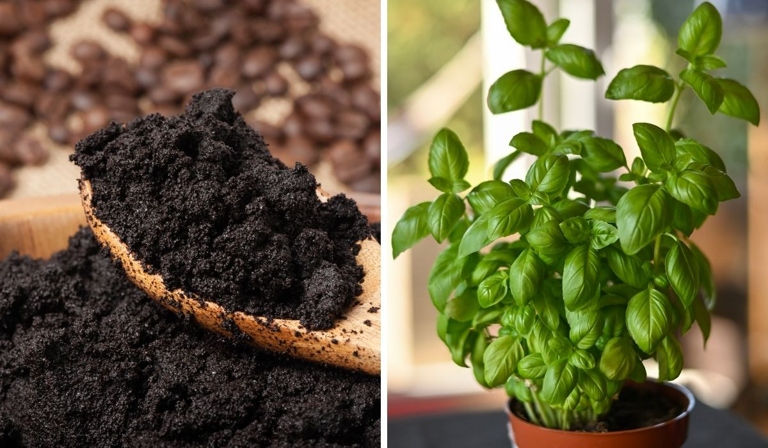
You can also add used coffee grounds to your compost pile. If you have a basil plant, you can try adding some coffee grounds to the soil.
How Much Coffee Should You Add to Your Basil?
Basil is also known to be a very fragrant herb. It has a strong flavor and is often used in Italian cuisine. Many people enjoy the smell of basil and use it in their homes to freshen the air. Basil is a popular herb that is used in many dishes.
Coffee grounds can help to fertilize the soil and make the basil plant grow more vigorously. However, too much coffee can make the basil taste bitter. Basil is known to like coffee grounds. It is important to find a balance when adding coffee grounds to your basil.
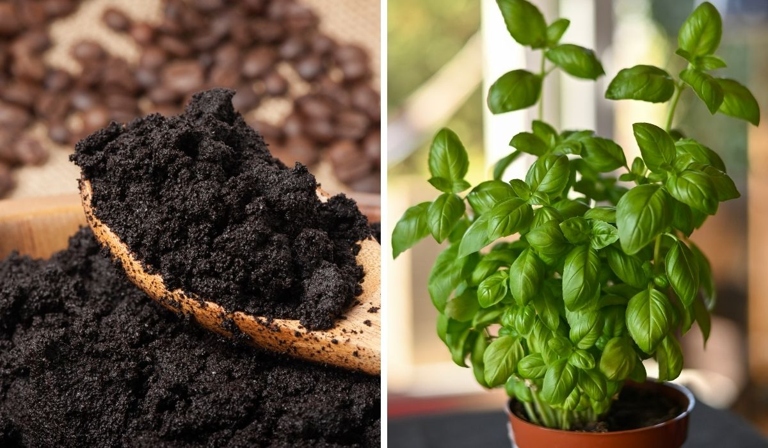
This will give your basil the nutrients it needs to grow without making it taste bitter. A general rule of thumb is to add one tablespoon of coffee grounds per one cup of soil. You can experiment with different amounts of coffee grounds to find the perfect balance for your basil plant.
How Often Should I Put Coffee Grounds on My Basil?
It has a strong, unique flavor that can enhance the taste of many foods. Many people enjoy growing their own basil so that they can have fresh herbs available whenever they need them. Basil is a popular herb that is used in many dishes.
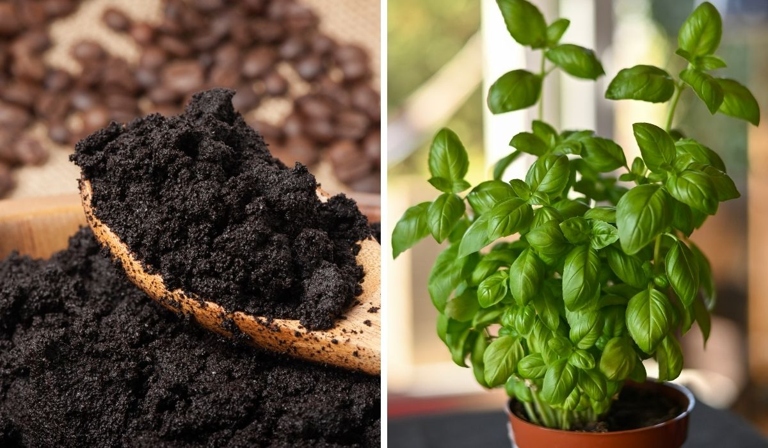
If you grow basil, you may be wondering if you can use coffee grounds to fertilize the plant. Coffee grounds are a popular type of organic fertilizer that can provide many benefits for plants. Simply sprinkle the grounds around the base of the plant and water them in. You can use coffee grounds to fertilize your basil every two weeks. Basil is known to be a heavy feeder, so it is important to fertilize it regularly.
In addition to using coffee grounds, you can also compost them. If you have a compost bin, you can add coffee grounds to it. Composting is a great way to reduce waste and provide your basil with nutrients. Simply sprinkle the grounds around the base of the plant and water them in. You can use coffee grounds to fertilize your basil every two weeks. Basil is known to be a heavy feeder, so it is important to fertilize it regularly. Otherwise, you can simply bury them in your garden.
Best Ways to Use Coffee Grounds on Basil
One way to help basil grow is by using coffee grounds. Basil is a popular herb that is often used in cooking. However, basil can be a bit finicky to grow. Many people enjoy the flavor of basil and use it to add flavor to their food.
Coffee grounds can help to improve the drainage of the soil and also add some extra nutrients to the soil. Coffee grounds can also help to keep the soil moist, which is another important factor for basil. Basil likes soil that is loose and well-drained, so coffee grounds can be a great way to help the plant grow.
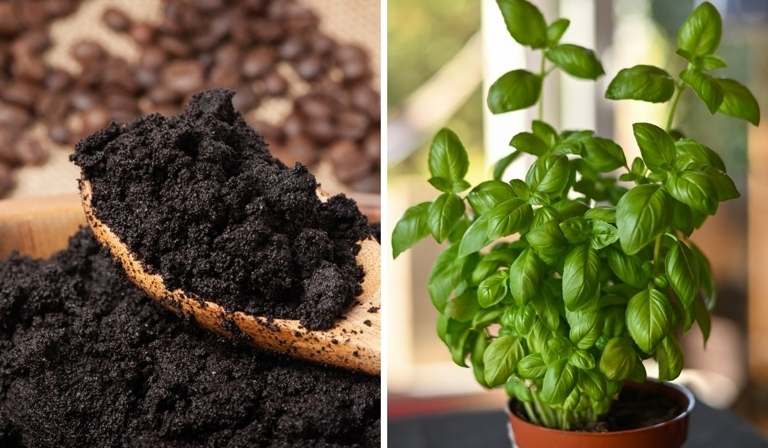
Mulching with coffee grounds can help to keep the soil moist and also help to prevent weeds from growing. In addition to using coffee grounds in the soil, you can also use them as a mulch.
Coffee grounds can help to improve the flavor of the basil and make it more robust. If you are looking for a way to add some extra flavor to your basil plants, you can try using coffee grounds. Simply add a few coffee grounds to the soil around your basil plants and see how they respond.
Composting using Coffee Grounds
Composting using Coffee Grounds
They are rich in nitrogen, which is an important nutrient for plants. Coffee grounds also help to aerate the compost and keep it from getting too dense. Coffee grounds are a great addition to your compost pile.
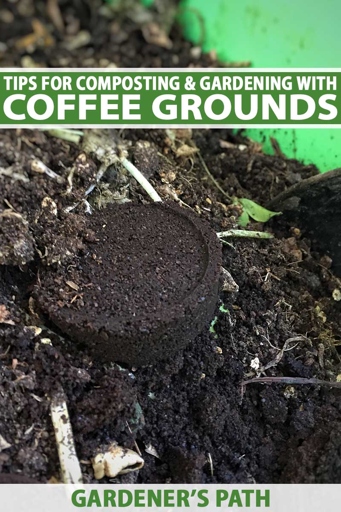
You can add coffee grounds to your compost pile at any time, but they will break down more quickly if you mix them in with other materials. To compost coffee grounds, simply add them to your compost bin along with your other organic materials.
If you have a lot of coffee grounds, you can also spread them around your garden as a mulch. This will help to suppress weeds and keep the soil moist.
Coffee Grounds as Organic Fertilizer
Organic coffee grounds can be used as an effective fertilizer for basil plants. When used as a top dressing, coffee grounds can also help to retain moisture in the soil and prevent weeds from taking over. The coffee grounds provide a rich source of nitrogen and other nutrients that help promote healthy growth.
Mixing Coffee Grounds with Mulch
Just be sure to mix the grounds evenly into the mulch, so that your plants don’t end up with too much or too little. Coffee grounds can provide a boost of nutrients to your plants, and help to keep pests away. If you’re looking for a way to use up those extra coffee grounds, mixing them into your mulch is a great option!
Adding Coffee Grounds to Potting Mix when Repotting
When it comes to repotting your basil, coffee grounds can be a great addition to the potting mix. Coffee grounds help to aerate the soil and improve drainage, which is important for basil. They also provide a bit of extra nutrients for the plant.
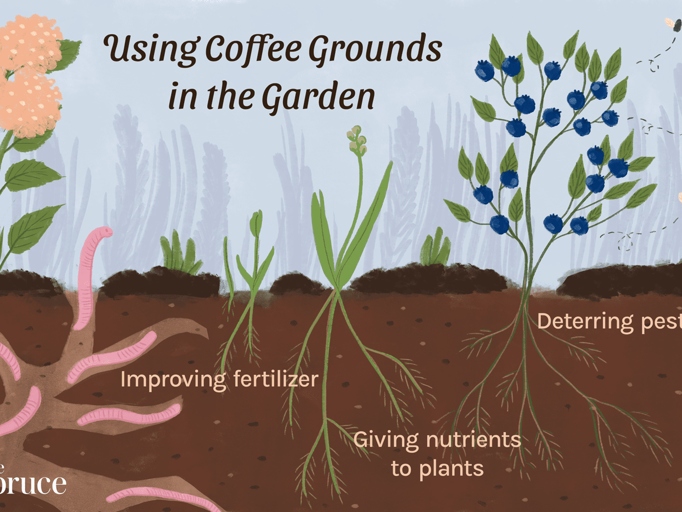
When it comes to how much to use, a general rule of thumb is to use about 1/4 cup of coffee grounds per gallon of potting mix. To use coffee grounds when repotting your basil, simply add a layer of them to the bottom of the pot before adding the potting mix. You can also mix them into the potting mix itself.
Coffee Grounds as Compost Tea
Coffee grounds can be used to make compost tea, which is a great way to fertilize your plants. You can also add coffee grounds to your compost pile, which will help to break down other organic matter. To make compost tea, simply steep coffee grounds in water for 24 hours, then strain and use the liquid to water your plants.
Using ‘Drip Feeding’ Method
Basil is a popular herb that is often used in cooking. Many people enjoy the taste of basil and the fact that it is relatively easy to grow. However, basil can be a finicky plant and it is important to know how to care for it properly in order to ensure that it thrives.
One method of caring for basil that is often recommended is called ‘drip feeding’. This method is said to be beneficial because it allows the plant to absorb the water more effectively and prevents the leaves from getting too wet, which can cause them to rot. This involves watering the plant slowly and evenly, allowing the water to ‘drip’ down through the soil and reach the roots of the plant.
Finally, if you notice that the leaves of your plant are starting to yellow or brown, this could be a sign that the plant is not getting enough water. If this happens, increase the frequency of your watering. If you are thinking about using the drip feeding method to care for your basil plant, it is important to keep a few things in mind. Second, be sure to check the soil regularly to make sure that it is not getting too dry – the soil should be moist but not soggy. First, make sure that you water the plant slowly and evenly so that the water has a chance to reach the roots.

By following these tips, you can help your basil plant to thrive using the drip feeding method.
Coffee Grounds and Seedlings
Coffee grounds are a popular addition to gardens and potted plants, but you may be wondering if they are actually good for your plants. While coffee grounds can be beneficial for some plants, they can also be harmful to others.
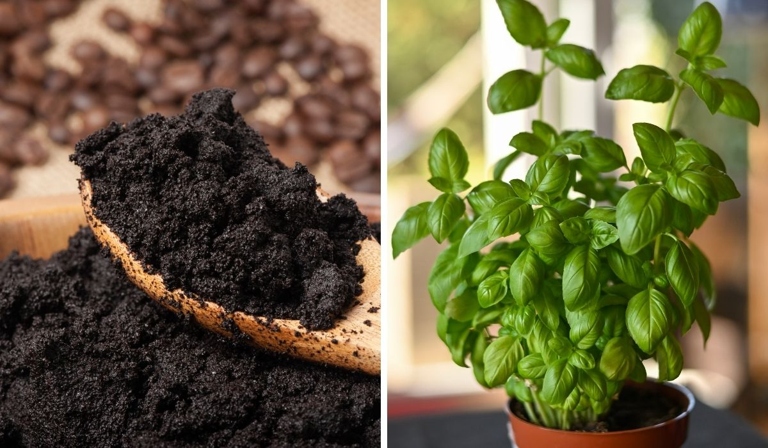
The coffee grounds add nutrients to the soil and help to repel pests. Some plants, like basil, thrive in coffee grounds. Too much acidity can damage the roots and prevent the seedlings from growing. If you are thinking about adding coffee grounds to your garden, it is important to do some research first. However, other plants, like seedlings, are sensitive to the acidity in coffee grounds.
There are plenty of other ways to add nutrients to your soil, such as composting. If you are unsure whether or not coffee grounds will be good for your plants, it is best to err on the side of caution and avoid using them.
Benefits of Using Coffee Grounds
Don’t toss them – coffee grounds can be used for a variety of purposes, including as a fertilizer for your garden. If you’re a coffee drinker, chances are you have a surplus of coffee grounds.
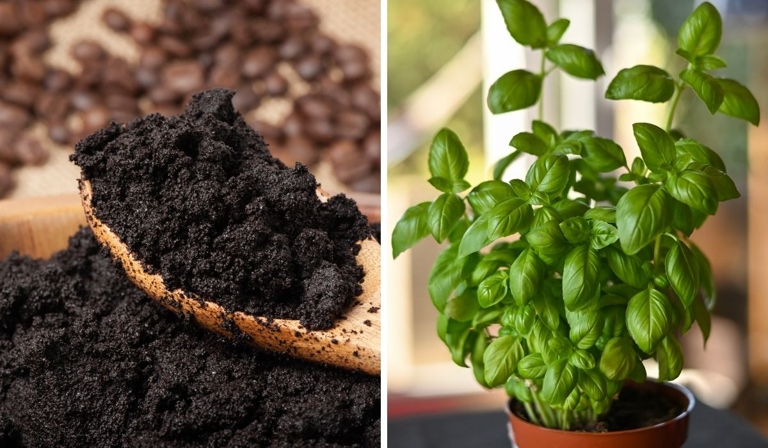
Here are some benefits of using coffee grounds in your garden:
Coffee grounds are rich in nitrogen, which is an essential nutrient for plants.
Coffee grounds can help improve drainage and aeration in the soil.
Coffee grounds can help deter pests and diseases.
Coffee grounds can also be used as mulch.
So, the next time you’re about to toss your coffee grounds, think twice – your plants may appreciate them more than you realize.
Prevents Diseases
It has a strong flavor that can add depth to a dish. Basil is an aromatic herb that is often used in cooking. But did you know that basil can also help prevent diseases?
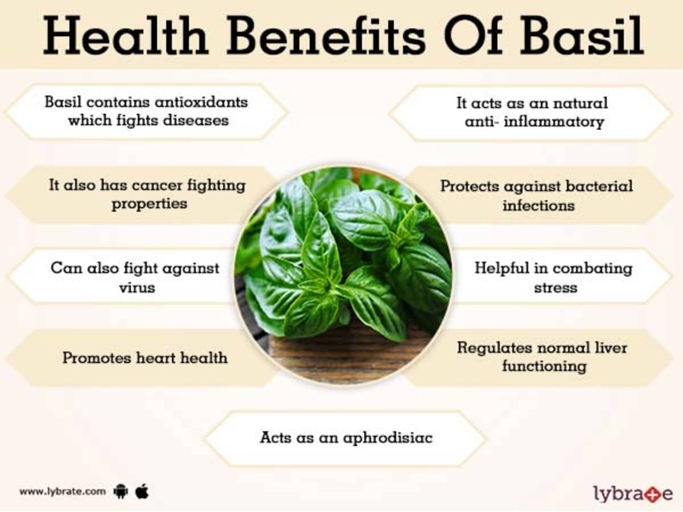
These properties can help protect your body against diseases like cancer and heart disease. Basil contains a compound called eugenol. Eugenol has been shown to have anti-inflammatory and antioxidant properties.
A strong immune system can help your body fight off infections and diseases. Basil also contains vitamins A and C. These vitamins are important for a strong immune system.
So, next time you are cooking with basil, remember that you are not only adding flavor to your dish, but you are also helping to prevent diseases.
Deters Pests
Did you know that basil can also be used to deter pests? Basil is a popular herb that has many uses, both in the kitchen and in the garden.
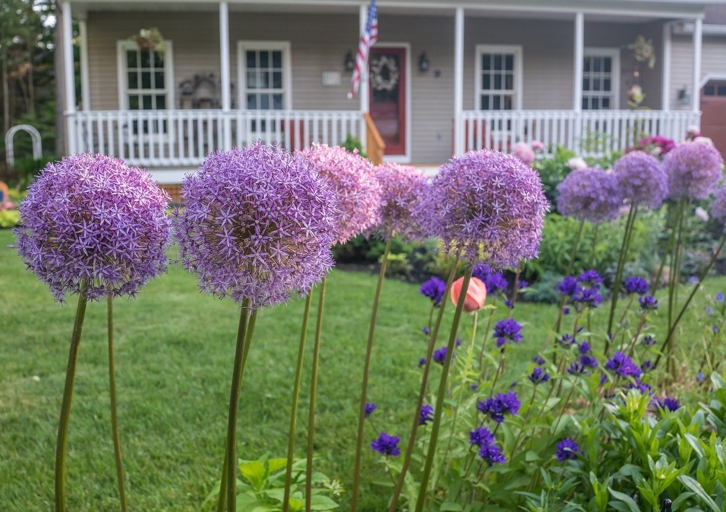
To use basil as a pest deterrent, simply crush a few leaves and sprinkle them around the areas where you think pests might be a problem. You can also try growing basil plants near areas where pests are a problem, such as near doorways or windows. Basil has a strong scent that can be off-putting to many pests, including mosquitoes, flies, and even mice.
If you have a pest problem that you can’t seem to solve, give basil a try. It’s a natural and effective way to keep pests at bay.
Improves Soil Quality
It has a strong flavor and is known for its ability to improve the taste of food. Basil is a popular herb that is used in many dishes. Basil is also known for its ability to improve soil quality.
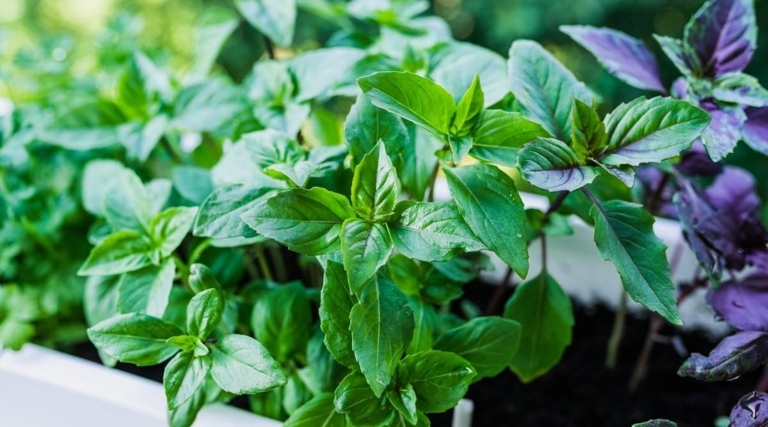
Basil also contains phosphorus, which is another essential nutrient for plants. Chlorophyll is what gives plants their green color. Basil is a good source of nitrogen, which is an essential nutrient for plants. Nitrogen is used by plants to create new cells and produce chlorophyll. Phosphorus is used by plants to create new cells, produce energy, and help with the metabolism of nutrients.
These nutrients help to improve the structure of the soil and make it more fertile. Basil also contains other nutrients that are beneficial to plants, such as potassium, calcium, and magnesium. Basil can also help to improve the drainage of the soil and make it more aerated.
Coffee grounds contain nitrogen, which basil needs to grow. It is important to remember that basil does like coffee grounds. If you add coffee grounds to your basil plants, they will grow faster and healthier. Basil is an easy herb to grow and is a great addition to any garden.
Water Retention Capacity
It’s important for farmers to know because it affects how much water their crops need. Water retention capacity is the amount of water a material can hold.
It is also known to have a high water retention capacity. This means that it can help your plants retain water for a longer period of time. Basil is a popular herb that is used in many dishes.
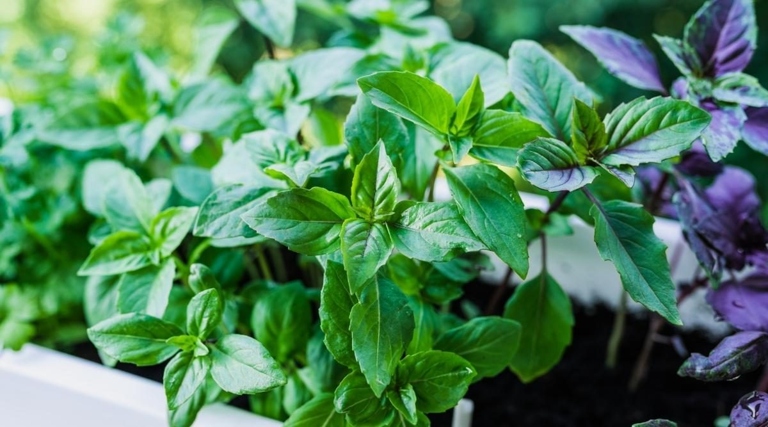
The high water retention capacity of basil will help to keep your compost moist. There are many ways to use basil to help your plants retain water. This is especially important in hot weather. One way is to add it to your compost pile.
This material helps to keep the ground moist and can also prevent weeds from growing. Basil makes an excellent mulch because it breaks down quickly and doesn’t compact the soil. Another way to use basil to help your plants retain water is to mulch with it. Mulching is a process of covering the ground around your plants with a layer of material.
If you’re looking for a way to help your plants retain water, consider using basil. The high water retention capacity of this popular herb can make a big difference in the health of your plants.
Improves Drainage Capacity
This is due to the fact that basil contains a compound called eugenol. It has a strong flavor and is often used in Italian cuisine. Basil is a popular herb that can be used in many different dishes. Basil is also known for its ability to improve drainage capacity. Eugenol is known for its ability to improve the drainage of soil. By adding basil to your coffee grounds, you can help to improve the drainage of your soil and make it easier for your plants to grow. When used in conjunction with coffee grounds, basil can help to improve the drainage of your soil.
Keeps Pets Away
The herb is also known for its ability to keep pests away. Basil can be used to keep pests away from your home and garden. Basil is a popular herb that is known for its distinct flavor and aroma.
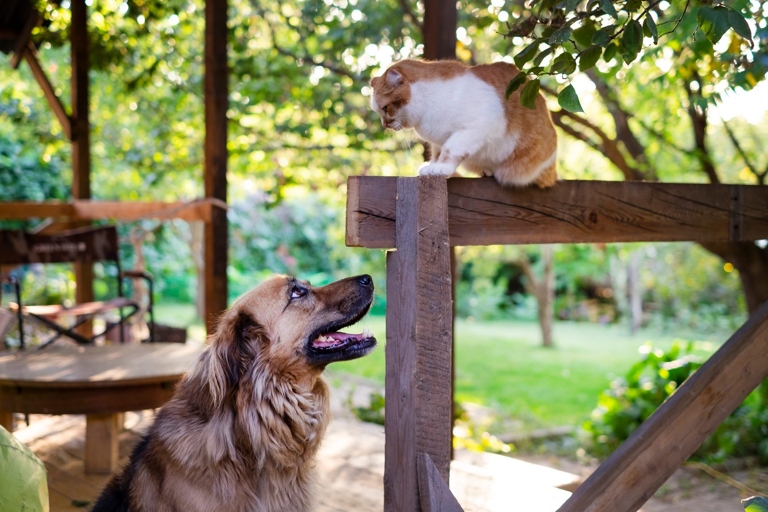
Basil can also be used to keep pests out of your garden. Basil has a strong scent that repels many pests. The herb can be used to keep ants, mosquitoes, and other pests away from your home.
To use basil to keep pests away, you can plant the herb near your home or in your garden. You can also place basil leaves around your home or in your garden.
Increases Soil Acidity
However, basil also has another use – it can help to increase soil acidity. Basil is a popular herb that is used in many dishes. It has a strong flavor and is known for its ability to add flavor to food.
This nitrogen helps to increase the acidity of the soil, making it more hospitable for other plants. Basil contains high levels of nitrogen, which is released into the soil when the plant is cut.
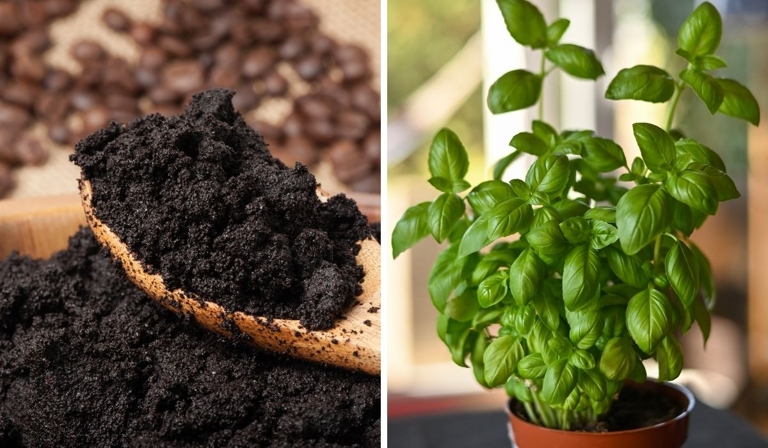
If you are looking to add more acid to your soil, then using basil is a great way to do it. Simply add some basil plants to your garden and watch the acidity levels rise.
Problems with Using Coffee Grounds
However, there are a few things to keep in mind when using coffee grounds in your garden. They’re rich in nitrogen and other nutrients that can give your plants a boost, and using them is a great way to reduce your environmental impact. It’s no secret that coffee grounds can be great for your plants.
If you’re growing plants that prefer neutral or alkaline soil, coffee grounds can do more harm than good. First, coffee grounds can make your soil too acidic for some plants. Second, coffee grounds can attract pests like slugs and snails. If you’re dealing with these pests already, using coffee grounds can make the problem worse.
Finally, coffee grounds can compact over time, making it difficult for roots to penetrate the soil. If you’re using coffee grounds in your garden, make sure to aerate the soil regularly to prevent this issue.
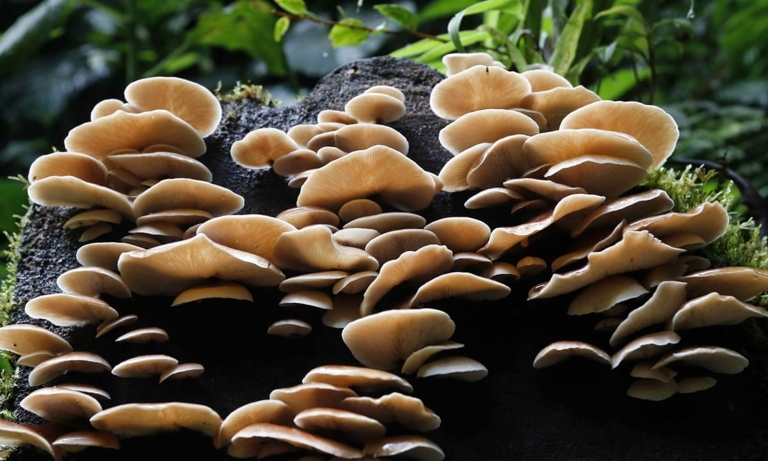
Just be sure to use them wisely, and you’ll be able to enjoy all the benefits they have to offer. Despite these potential problems, coffee grounds can be a great addition to your garden.
Promotes Fungal Growth
This will help to prevent the growth of mold and mildew. Basil is a popular herb that is used in many dishes. When using coffee grounds, it is important to make sure that they are completely dry before adding them to the soil. Coffee grounds are a great source of nitrogen and can help to promote the growth of basil. It has a strong flavor and is known for its ability to promote fungal growth.
Excess Moisture Retention
Basil is a moisture-loving herb that does well when the soil is kept evenly moist, but not soggy. If the soil is too dry, the leaves will wilt and the plant will eventually die. If the soil is too wet, the roots will rot and the plant will also die.
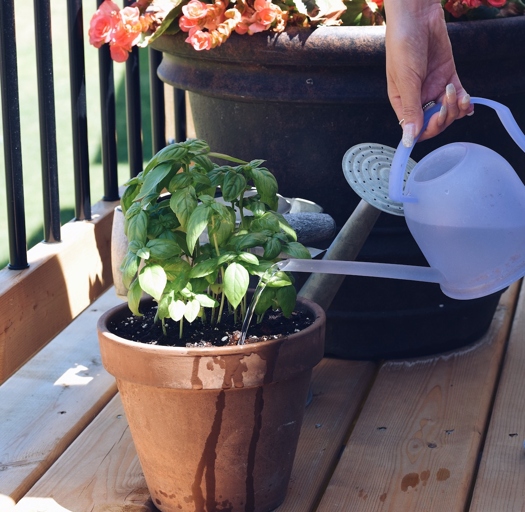
When growing basil, it’s important to water the plant when the top inch of soil feels dry to the touch. Basil does not like to be waterlogged, so be sure to empty any water that collects in the saucer beneath the pot. Water the plant at the base, taking care not to wet the leaves.
This is a sign that the air is too moist for the plant and that it needs more drainage. If you live in a humid climate, you may find that your basil plant is constantly wilting, no matter how often you water it. Repot the plant in a pot with drainage holes and set it on a saucer or tray of pebbles to help keep the roots dry.
Attracts Pests
You can also put a few leaves in a sachet and place it in areas where pests are a problem, such as in cupboards or near doors and windows. You can grow basil in your kitchen or purchase it fresh from the grocery store. Basil is an herb that has a strong, pungent smell that can deter many common pests, including flies, mosquitoes, and even mice. If you’re looking for a natural way to keep pests out of your home, you might want to try using basil. To use it, simply crush a few leaves and sprinkle them around the perimeter of your home.
Can Inhibit Plant Growth
However, if you mix the coffee grounds with other organic matter, it will provide a slow release of nutrients for the plant and will not make the soil too acidic. Coffee grounds can inhibit plant growth if they are not used properly. If you put coffee grounds directly on the soil, it can prevent the plant from getting the nutrients it needs. The coffee grounds will also make the soil too acidic for the plant to grow.
Potential Risks to Soil
However, there are some potential risks to using basil in your garden. Basil is a popular herb that is used in many dishes.
If you have basil plants that are infested with nematodes, you may notice the leaves turning yellow and wilting. Basil can be a host for nematodes, which are tiny parasitic worms that can damage plant roots. The plant may also produce fewer leaves and flowers.
You can also try planting basil in pots or containers so that the nematodes cannot reach the roots. Plant them in a different location each year so that the nematodes have less chance of infecting them. To avoid nematodes, it is important to rotate your basil plants.
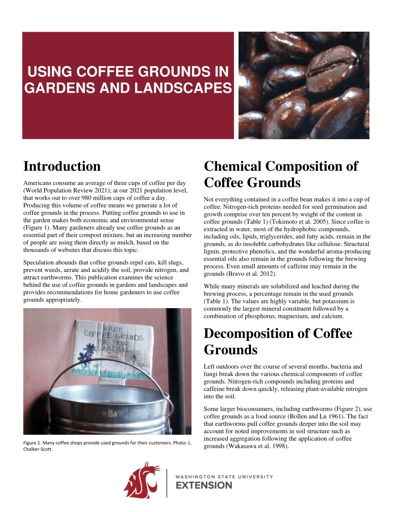
Fungi can cause the leaves of the plant to turn yellow, brown, or black. In addition to nematodes, basil can also be affected by fungi. They can also cause the plant to produce fewer leaves and flowers.
You can also try using a fungicide to treat the plants. To avoid fungi, water your basil plants in the morning so that the leaves have time to dry before nightfall. This will help to prevent the fungi from growing.
Watering with Leftover Coffee
If you’re a coffee drinker, chances are you’ve considered using your leftover coffee grounds to water your plants. But does basil like coffee grounds?

Coffee grounds contain nitrogen, which is an important nutrient for basil plants. It turns out that coffee grounds can be a great addition to your basil plant’s soil. In addition, coffee grounds can help to improve drainage and aeration in the soil.
You can also add used coffee grounds to your compost pile. To use coffee grounds as a fertilizer, simply mix them into the soil around your basil plant.
So if you’re wondering whether basil likes coffee grounds, the answer is a resounding yes! Not only will your basil plant benefit from the extra nitrogen, but it will also appreciate the improved drainage and aeration.
A Cup of Coffee Ground Compost Tea, Anyone?
You may love your daily cup of joe, but did you know your coffee grounds can be used as a nutrient-rich compost for your plants? That’s right – coffee grounds can be used as a compost tea, providing your plants with a healthy dose of nitrogen, phosphorus, and potassium.
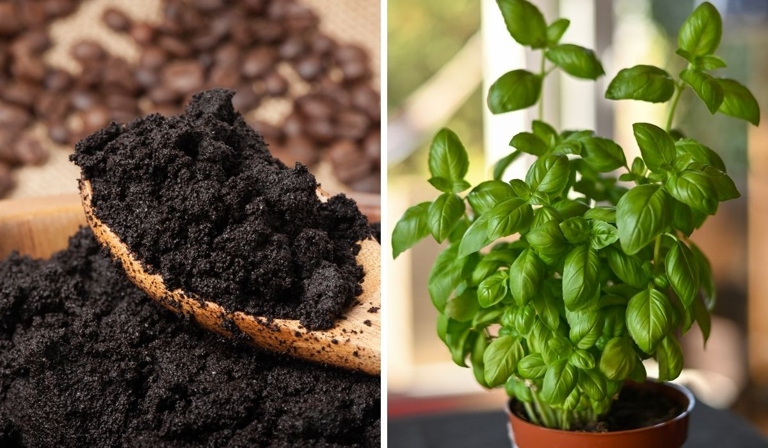
To make a cup of coffee ground compost tea, simply add a cup of coffee grounds to a gallon of water and let it steep for 24 hours. After 24 hours, strain the coffee grounds and use the tea to water your plants.
Not only is coffee ground compost tea great for your plants, it’s also a great way to recycle your coffee grounds. So next time you’re about to throw out your coffee grounds, think twice – your plants may just thank you for it!
Frequently Asked Questions
1. What is basil?
Basil is a popular herb that is used in many cuisines. It has a strong, pungent flavor and is often used in Italian dishes.
2. Does basil like coffee grounds?
Yes, basil does like coffee grounds. In fact, coffee grounds can be used to help fertilize basil plants.
3. How do I use coffee grounds to fertilize my basil plant?
Simply add a handful of coffee grounds to the soil around your basil plant. The coffee grounds will help to provide nutrients to the plant.
4. Do I need to use a lot of coffee grounds?
No, a small amount of coffee grounds will do. Just add a handful or two around the base of your plant.
5. Can I use other types of coffee?
Yes, you can use other types of coffee, such as decaf coffee or espresso. However, regular coffee grounds will work just fine.
Final thoughts
Basil is a versatile herb that can be used in many different dishes. It has a strong flavor that can be used to add depth to a dish. Basil can be used in soups, stews, sauces, and even desserts. It is a versatile herb that can be used to add flavor to many different dishes.
